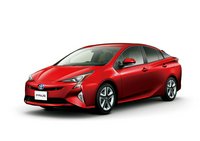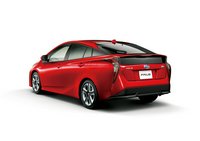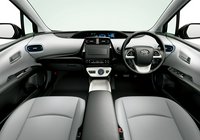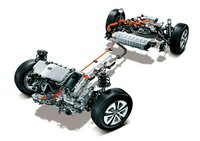Toyota Prius 4 (XW50)
Compact SedanProduct Gallery






Product Overview
Toyota Prius Mk4 (chassis code XW50) is an affordable compact liftback sedan in production from 2016. It is available with a single Atkinson-cycle inline-4 engine that displaced 1.8 liters in a petrol hybrid setup.
The plug-in hybrid drivetrain can help the owner save on fuel and car tax, though those who plan on keeping the car after warranty should be mindful of the complexity. Fortunately, the Prius has proven to be the single most reliable hybrid vehicle.
Toyota has made a good effort in aerodynamics, with a decent 0.25 coefficient of drag to show for it. The official fuel economy rating is exceptionally rosy, though it may cast more doubts on the trustworthiness of the regulators and perhaps the owner's own sanity than it relates to reality.
Another plus is the small 10.2m (33.5ft) turning circle.
Ratings
What we found
Neofiliac score 41%
Pros
- Good 0.25 drag coefficient
- Low official fuel consumption
- Small turning circle
Cons
- Horrible 0-100kph time
- Can't even reach 200km/h
- Miserably low engine output
- Short full-electric range
What external reviewers found
External score 62%
Pros
- Superb range
- Good range
- Good fuel efficiency
- Good fuel economy
Cons
- Lack of practicality
- Awkward to drive
- Middling infotainment system
- EV mode is still poor
- Expensive compared to rivals
- Lack of tech
Your rating:
12345678910
?/10
Price Comparison
As associates of the merchants above, we earn a commission when you make a purchase using the supplied links.
Specifications
[{"Ft":"Capacity","Fn":"Cargo Capacity","Fv":"191 L / 6.7 cu-ft ~ 1204 L / 42.5 cu-ft"},{"Ft":"Capacity","Fn":"Coolant Capacity","Fv":"6.0 L / 6.3 qt"},{"Ft":"Capacity","Fn":"Engine Oil Capacity","Fv":"4.2 L / 4.4 qt"},{"Ft":"Capacity","Fn":"Fuel Capacity","Fv":"43.0 L / 11.4 gal"},{"Ft":"Capacity","Fn":"Passengers","Fv":"5"},{"Ft":"Capacity","Fn":"Payload","Fv":"380 kg / 838 lbs"},{"Ft":"Chassis","Fn":"Brakes | Front","Fv":"Ventilated discs"},{"Ft":"Chassis","Fn":"Brakes | Rear","Fv":"Disc"},{"Ft":"Chassis","Fn":"Power Steering","Fv":"Electric Steering"},{"Ft":"Chassis","Fn":"Suspension | Front","Fv":"MacPherson strut"},{"Ft":"Chassis","Fn":"Suspension | Rear","Fv":"Double-wishbone"},{"Ft":"Chassis","Fn":"Tire Size","Fv":"195/65 R15, 215/45R17"},{"Ft":"Chassis","Fn":"Turning Circle","Fv":"10.2 m / 33.5 ft"},{"Ft":"Construction","Fn":"Battery | Capacity","Fv":"8.8 kWh (gross)"},{"Ft":"Construction","Fn":"Battery | Type","Fv":"Lithium-ion"},{"Ft":"Construction","Fn":"Battery | Voltage","Fv":"352.0 V"},{"Ft":"Construction","Fn":"Body Style","Fv":"5-door plug-in hybrid Sedan"},{"Ft":"Dimensions","Fn":"Size | Height","Fv":"1470 mm / 57.9 in"},{"Ft":"Dimensions","Fn":"Size | Length","Fv":"4645 mm / 182.9 in"},{"Ft":"Dimensions","Fn":"Size | Width","Fv":"1760 mm / 69.3 in"},{"Ft":"Dimensions","Fn":"Track Width | Front","Fv":"1530.0 mm / 60.2 in"},{"Ft":"Dimensions","Fn":"Track Width | Rear","Fv":"1545.0 mm / 60.8 in"},{"Ft":"Dimensions","Fn":"Weight","Fv":"1530.0 kg / 3373.1 lbs"},{"Ft":"Dimensions","Fn":"Wheel Size","Fv":"6J x 15, 7J x 17"},{"Ft":"Dimensions","Fn":"Wheelbase","Fv":"2700 mm / 106.3 in"},{"Ft":"Performance","Fn":"Acceleration | 0 - 100 km/h","Fv":"11.1 sec"},{"Ft":"Performance","Fn":"Acceleration | 0 - 60 mph","Fv":"10.5 sec"},{"Ft":"Performance","Fn":"CO2 Emission","Fv":"28 ~ 35 g/km"},{"Ft":"Performance","Fn":"Coefficient Of Drag","Fv":"0.25"},{"Ft":"Performance","Fn":"Electric Range","Fv":"45.0 km / 28.0 mi"},{"Ft":"Performance","Fn":"Fuel Economy","Fv":"1.3 L/100km / 180.9 MPG (combined)"},{"Ft":"Performance","Fn":"Top Speed","Fv":"162.0 km/h / 100.7 mph, 135.0 km/h / 83.9 mph (EV mode)"},{"Ft":"Powertrain","Fn":"Drivetrain Layout","Fv":"Front-engine (transverse), Front-wheel drive"},{"Ft":"Powertrain","Fn":"Emission Standard","Fv":"Euro 6"},{"Ft":"Powertrain","Fn":"Engine","Fv":"2ZR-FXE"},{"Ft":"Powertrain","Fn":"Engine | Bore","Fv":"80.5 mm / 3.2 in"},{"Ft":"Powertrain","Fn":"Engine | Compression Ratio","Fv":"13.0:1"},{"Ft":"Powertrain","Fn":"Engine | Displacement","Fv":"1.8 L / 109.7 cu-in / 1798.0 cc"},{"Ft":"Powertrain","Fn":"Engine | Power","Fv":"98.0 hp / 73.1 kW @ 5200 rpm + 31.0 hp / 23.1 kW (electric motor)"},{"Ft":"Powertrain","Fn":"Engine | Specific Output","Fv":"54.5 hp/L / 0.9 hp/cu-in"},{"Ft":"Powertrain","Fn":"Engine | Stroke","Fv":"88.3 mm / 3.5 in"},{"Ft":"Powertrain","Fn":"Engine | Torque","Fv":"142 Nm / 104.7 lb-ft @ 3600 rpm + 40 Nm / 29.5 lb-ft"},{"Ft":"Powertrain","Fn":"Engine | Type","Fv":"Naturally-aspirated multi-port injected petrol inline-4 DOHC engine with 4 values per cylinder"},{"Ft":"Powertrain","Fn":"Transmission | Type","Fv":"e-CVT"},{"Ft":"Production","Fn":"Availability","Fv":"2016"}]
External Reviews
autocar[1]
Reviewer score 65% (normalized by Neofiliac)At £33,195, our Prius Business Edition Plus costs £7200 more than a similar-spec non-PHEV Prius. Despite that, it charges nearly twice as quickly, yet it’s only 50 percent heavier (at 120kg) and 66 percent bulkier than its predecessor. For that difference, you get a roof-mounted solar panel (which contributes two to three miles’ city driving a day in full sun, or more than 400 miles in a year)
Pros
- Powerful petrol engine
- Decent economy
- Good range
Cons
- Boring boot
- Lack of practicality
autoexpress[2]
Reviewer score 72% (normalized by Neofiliac)The Toyota Prius Mk4 arrived in 2016, and it's based on Toyota's latest platform that's also used on the C-HR crossover and latest Corolla. Power comes from a 97bhp 1.8 VVT petrol engine combined with a 71bhp electric motor, while a 1.31kWh battery is stowed under the platform to store energy from braking and the electric motor. Prices for the Prius start from around £24,500, and the range comprises Active, Business Edition and Excel trims.
Pros
- Fastest petrol-electric hybrid
- Decent fuel economy
Cons
- Cheap to run
- No automatic gearbox
carmagazine[3]
Reviewer score 75% (normalized by Neofiliac)The new plug-in model adds a significant amount to the purchase price – but in exchange you get three times the fuel economy. Charge the car up fully and you'll get 34 miles of pure-electric range. Shuffle the power around and models on the smallest wheels claim to achieve a staggering 217mpg. Owners also get a choice of three drive modes: Normal, Eco and Power.
Pros
- Powerful petrol engine
- Superb range
- Good fuel economy
Cons
- Pricier than standard Prius
- Alternatives are more fun to drive
cnet[4]
Reviewer score 61% (normalized by Neofiliac)The inside of the cabin feels light, airy and roomy. All of the interior controls are straightforward to use and get to grips with. The Prius also got a mild update on the outside for 2019. For all the technology under the hood, the Prius' in-car tech disappoints.
Pros
- Affordable price
- Good fuel efficiency
- Decent infotainment
Cons
- Lack of tech
- Awkward to drive
- No Android Auto or Apple CarPlay
Also Check
References
<
>
x